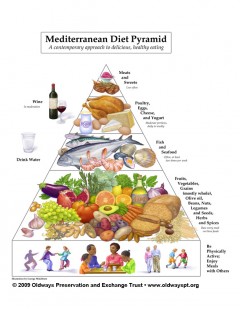Share This
The Key to Longevity: Eat Mediterranean-Style
Joan Salge Blake, MS, RD, LDN
Joan is a clinical associate professor and registered dietitian at Boston University in the Nutrition Program. Joan is the author of “Nutrition &You,” 2nd Edition, Pearson/Benjamin Cummings (2012) and “Nutrition & You: Core Concepts to Good Health,” Pearson/Benjamin Cummings (2010). She is also an American Dietetic Association national media spokesperson. Her interactive nutrition tools, and healthy and delicious recipes can be found on her website. Follow her on Twitter @joansalgeblake or visit her Nutrition blog at Boston.com.
May is National Mediterranean Diet Month.
Why should we devote an entire month to eating a Mediterranean-style diet? Because the research that backs up the health advantages of this style of eating is stacked higher than the Mediterranean Diet Pyramid.
It all started circa 1960 in several areas of the Mediterranean region, specifically the Greek island of Crete, other areas of Greece and southern Italy. Researchers were drawn to these areas because the adults living there had very low rates of chronic diseases, such as heart disease and cancer, as well as very long life expectancy. For examples, the natives of Greece had a rate of heart disease that was 90 percent lower than that of Americans at the time. (Mind you, heart disease and cancer are still currently two of the top killers of Americans.)
In addition to a physically active lifestyle, these Mediterranean natives consumed a diet that was rich in grains, fruits, vegetables, legumes, and nuts. In fact, more than 60 percent of the calories in their diets in the 1960s were supplied by these high-fiber, nutritionally-dense plant foods. The majority of the fat in the diet was provided by olives and olive oil, and fish and seafood was enjoyed at least twice a week. (Note: the latest recommendation from the USDA is to consume at least two fish meals, especially fatty fish such as salmon, weekly to increase longevity.)
Following this traditional 1960s Mediterranean Diet, foods from animal sources were limited as well as sweets. Water was abundantly consumed throughout the day and low to moderate amounts of wine were enjoyed, typically only with meals. Equally important, meals were enjoyed with friends and family.
Fast forward to the present, ongoing research continues to support the health benefits of the Mediterranean diet. In fact, one would be hard pressed to find a study that found that this type of eating style was unhealthy.
With the warmer weather and budding of plants around us, May is the perfect month to start enjoying more of a plant-based, Mediterranean diet and lifestyle. Here’s some tips:
- Try nonfat Greek yogurt with berries and some nuts at breakfast.
- Bake, broil or grill extra salmon steaks at dinner and have the leftovers the next day in a lunch salad. Pesto: You just met your minimum “two weekly fish meals.”
- Stoke up the BBQ and grill tons of veggies drizzled with a little olive oil. Leftovers are fabulous as a cold snack.
- Make beans the focus of one meal weekly. Here’s an easy Pasta Bean Toss recipe.
- Try leaving your car parked in the driveway on the weekends and do your errands on foot. You’ll not only step up your physical activity but also save $$ on gasoline.
Click here for more tips from Oldways, the brains behind the Mediterranean Diet Pyramid, as well as tons of recipes to help you bring a little Mediterranean into each day of May and beyond.
Cheers!
Originally published on the blog Nutrition and You!.



Add a Comment